The document discusses arrays in C++. It defines arrays as structures that hold a collection of related data items of the same type. Arrays have a fixed size that is set when they are declared. Individual elements in an array are accessed using an index number inside square brackets. The document provides examples of declaring, initializing, and accessing values in arrays. It also demonstrates using a constant variable to set the size of an array and looping through arrays to sum elements or print a histogram.
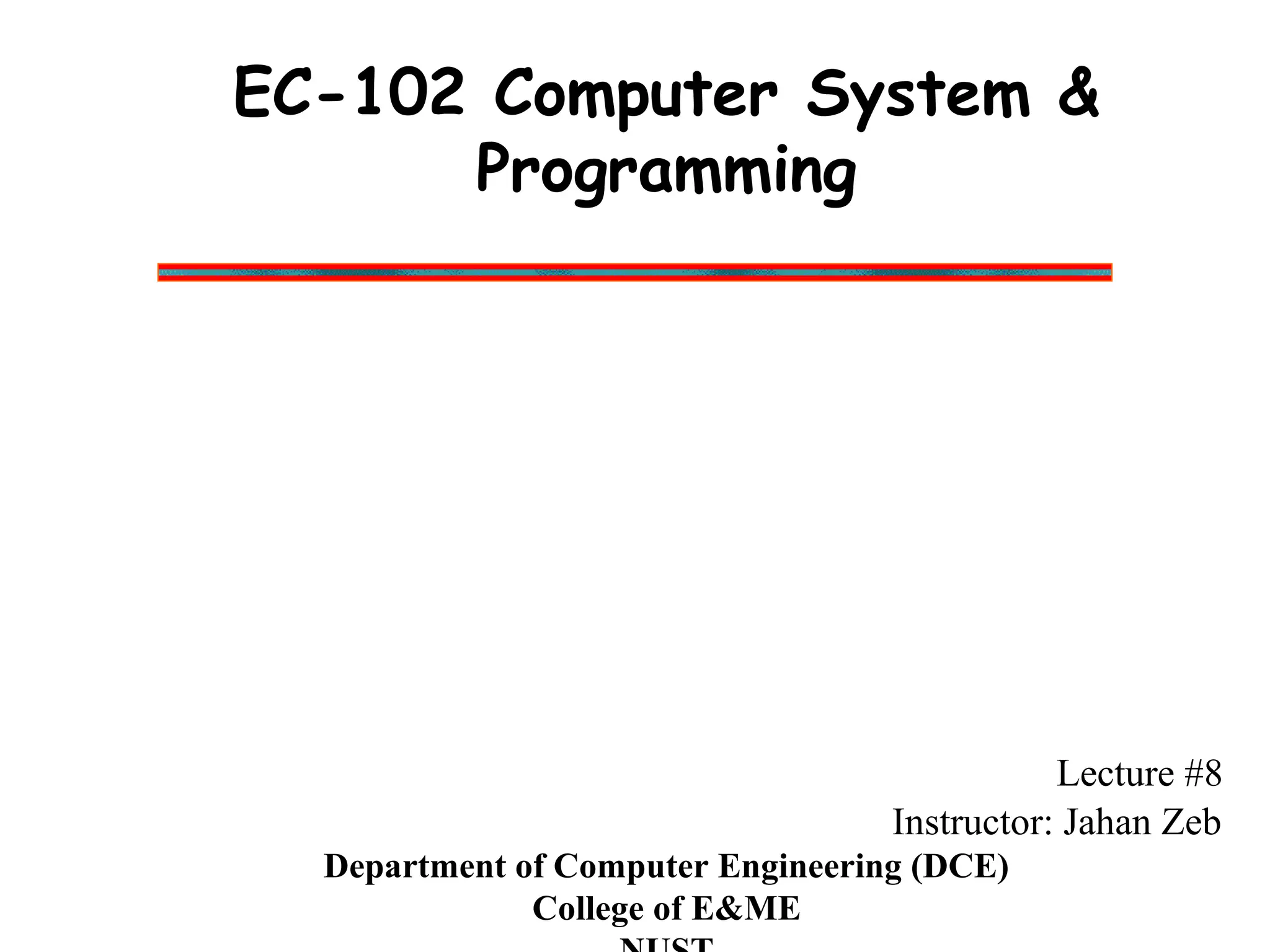

![Arrays
Array
– Consecutive group of memory locations
– Same name and type (int, char, etc.)
To refer to an element
– Specify array name and position number (index)
– Format: arrayname[ position number ]
– First element at position 0
N-element array c
c[ 0 ], c[ 1 ] … c[ n - 1 ]
– Nth element as position N-1](https://image.slidesharecdn.com/lecture8-csp-170130123342/75/Lecture-8-introduction-to-array-with-examples-c-3-2048.jpg)
![Arrays
Array elements like other variables
– Assignment, printing for an integer array c
c[ 0 ] = 3;
cout << c[ 0 ];
Can perform operations inside subscript
c[ 5 – 2 ] same as c[3]](https://image.slidesharecdn.com/lecture8-csp-170130123342/75/Lecture-8-introduction-to-array-with-examples-c-4-2048.jpg)
![Arrays
c[6]
-45
6
0
72
1543
-89
0
62
-3
1
6453
78
Name of array (Note that
all elements of this array
have the same name, c)
c[0]
c[1]
c[2]
c[3]
c[11]
c[10]
c[9]
c[8]
c[7]
c[5]
c[4]
Position number of the
element within array c](https://image.slidesharecdn.com/lecture8-csp-170130123342/75/Lecture-8-introduction-to-array-with-examples-c-5-2048.jpg)
![Declaring Arrays
When declaring arrays, specify
– Name
– Type of array
• Any data type
– Number of elements
– type arrayName[ arraySize ];
int c[ 10 ]; // array of 10 integers
float d[ 3284 ]; // array of 3284 floats
Declaring multiple arrays of same type
– Use comma separated list, like regular variables
int b[ 100 ], x[ 27 ];](https://image.slidesharecdn.com/lecture8-csp-170130123342/75/Lecture-8-introduction-to-array-with-examples-c-6-2048.jpg)
![Examples Using Arrays
Initializing arrays
– For loop
• Set each element
– Initializer list
• Specify each element when array declared
int n[ 5 ] = { 1, 2, 3, 4, 5 };
• If not enough initializers, rightmost elements 0
– To set every element to same value
int n[ 5 ] = { 0 };
– If array size omitted, initializers determine size
int n[] = { 1, 2, 3, 4, 5 };
• 5 initializers, therefore 5 element array](https://image.slidesharecdn.com/lecture8-csp-170130123342/75/Lecture-8-introduction-to-array-with-examples-c-7-2048.jpg)
![1
2 // Initializing an array.
3 #include <iostream>
4
5 using std::cout;
6 using std::endl;
7
8 #include <iomanip>
9
10 using std::setw;
11
12 int main()
13 {
14 int n[ 10 ]; // n is an array of 10 integers
15
16 // initialize elements of array n to 0
17 for ( int i = 0; i < 10; i++ )
18 n[ i ] = 0; // set element at location i to 0
19
20 cout << "Element" << setw( 13 ) << "Value" << endl;
21
22 // output contents of array n in tabular format
23 for ( int j = 0; j < 10; j++ )
24 cout << setw( 7 ) << j << setw( 13 ) << n[ j ] << endl;
25
Declare a 10-element array of
integers.
Initialize array to 0 using a
for loop. Note that the array
has elements n[0] to n[9].](https://image.slidesharecdn.com/lecture8-csp-170130123342/75/Lecture-8-introduction-to-array-with-examples-c-8-2048.jpg)
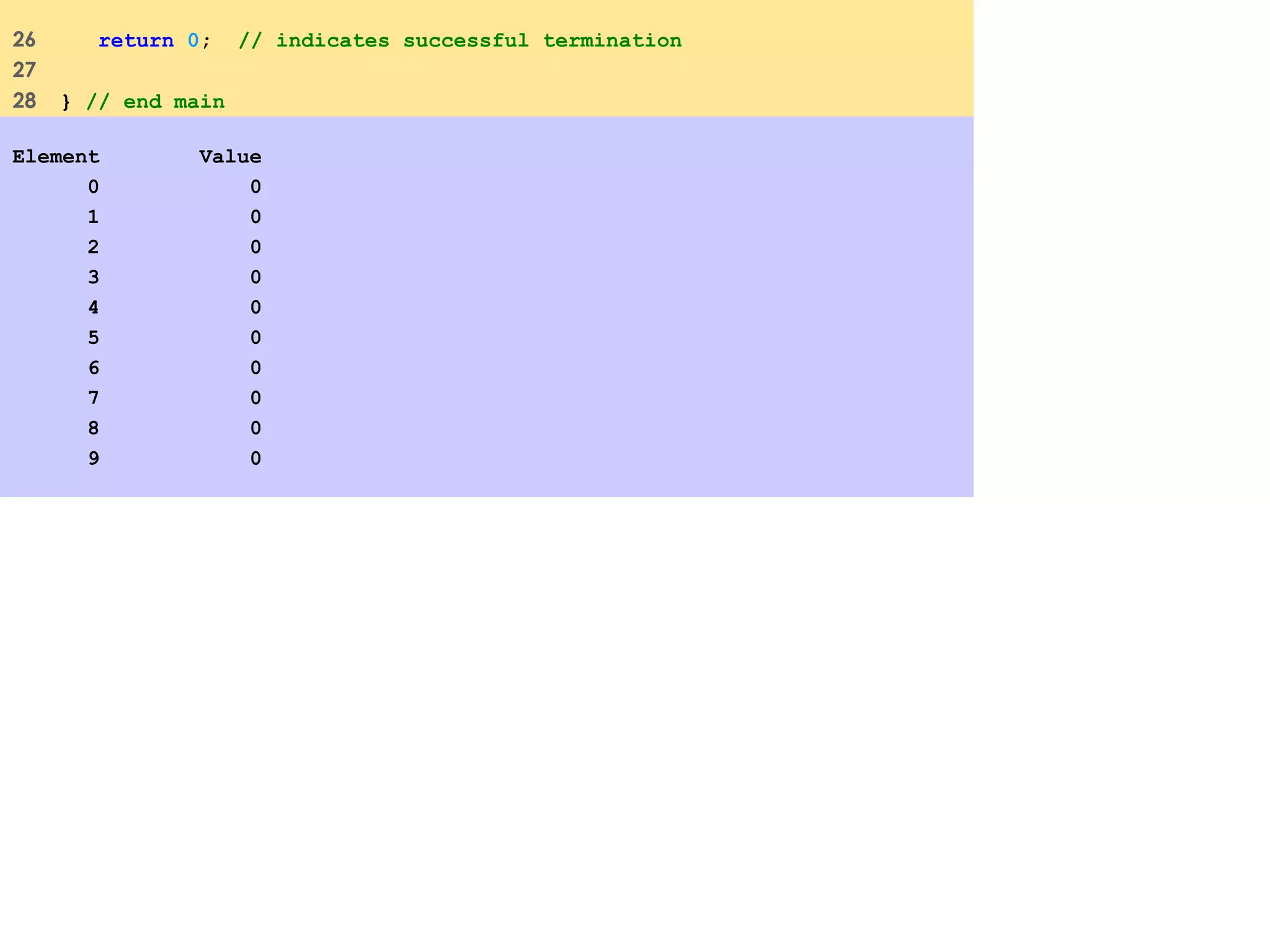
![1
2 // Initializing an array with a declaration.
3 #include <iostream>
4
5 using std::cout;
6 using std::endl;
7
8 #include <iomanip>
9
10 using std::setw;
11
12 int main()
13 {
14 // use initializer list to initialize array n
15 int n[ 10 ] = { 32, 27, 64, 18, 95, 14, 90, 70, 60, 37 };
16
17 cout << "Element" << setw( 13 ) << "Value" << endl;
18
19 // output contents of array n in tabular format
20 for ( int i = 0; i < 10; i++ )
21 cout << setw( 7 ) << i << setw( 13 ) << n[ i ] << endl;
22
23 return 0; // indicates successful termination
24
25 } // end main
Note the use of the initializer
list.](https://image.slidesharecdn.com/lecture8-csp-170130123342/75/Lecture-8-introduction-to-array-with-examples-c-10-2048.jpg)
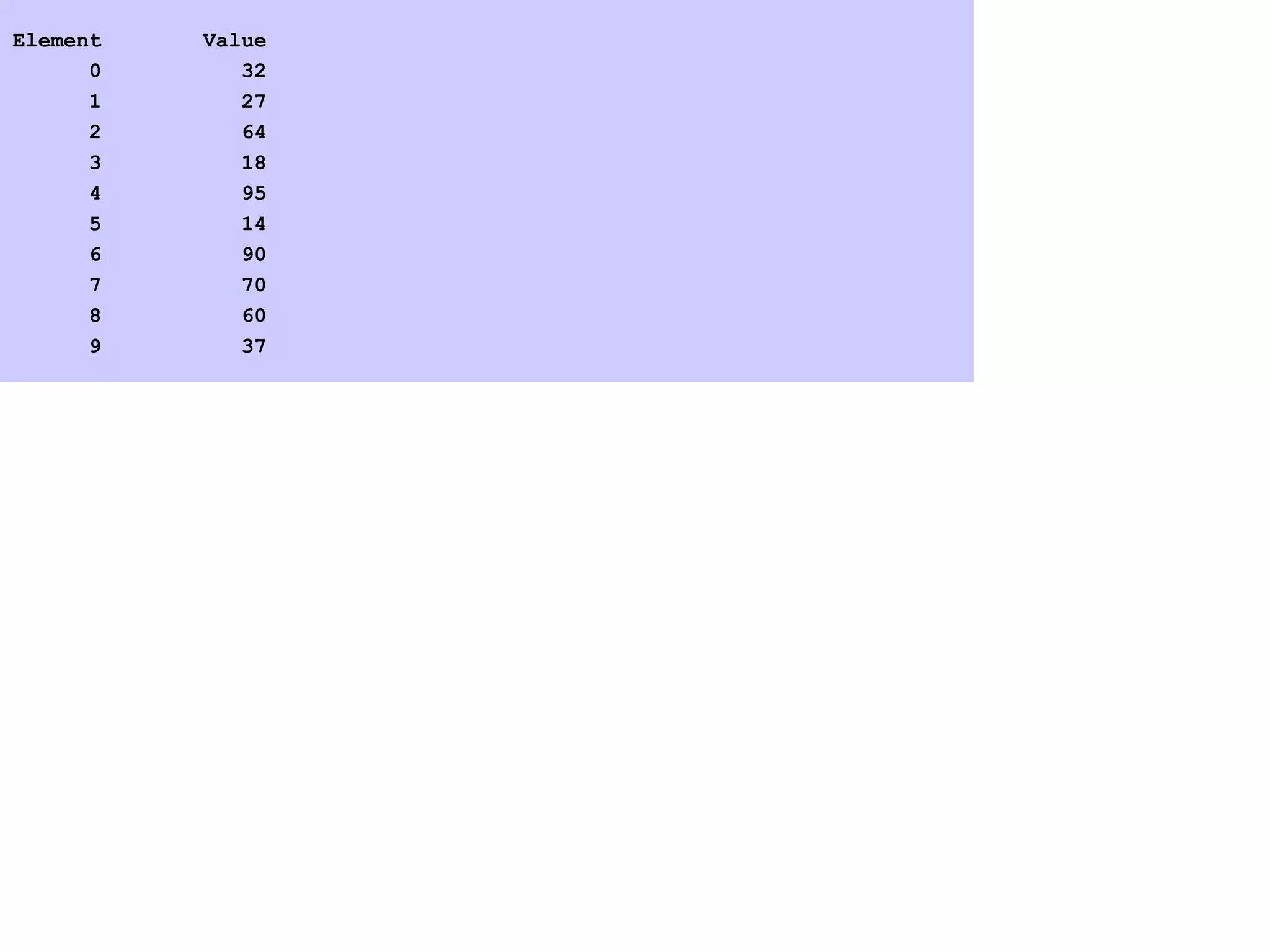
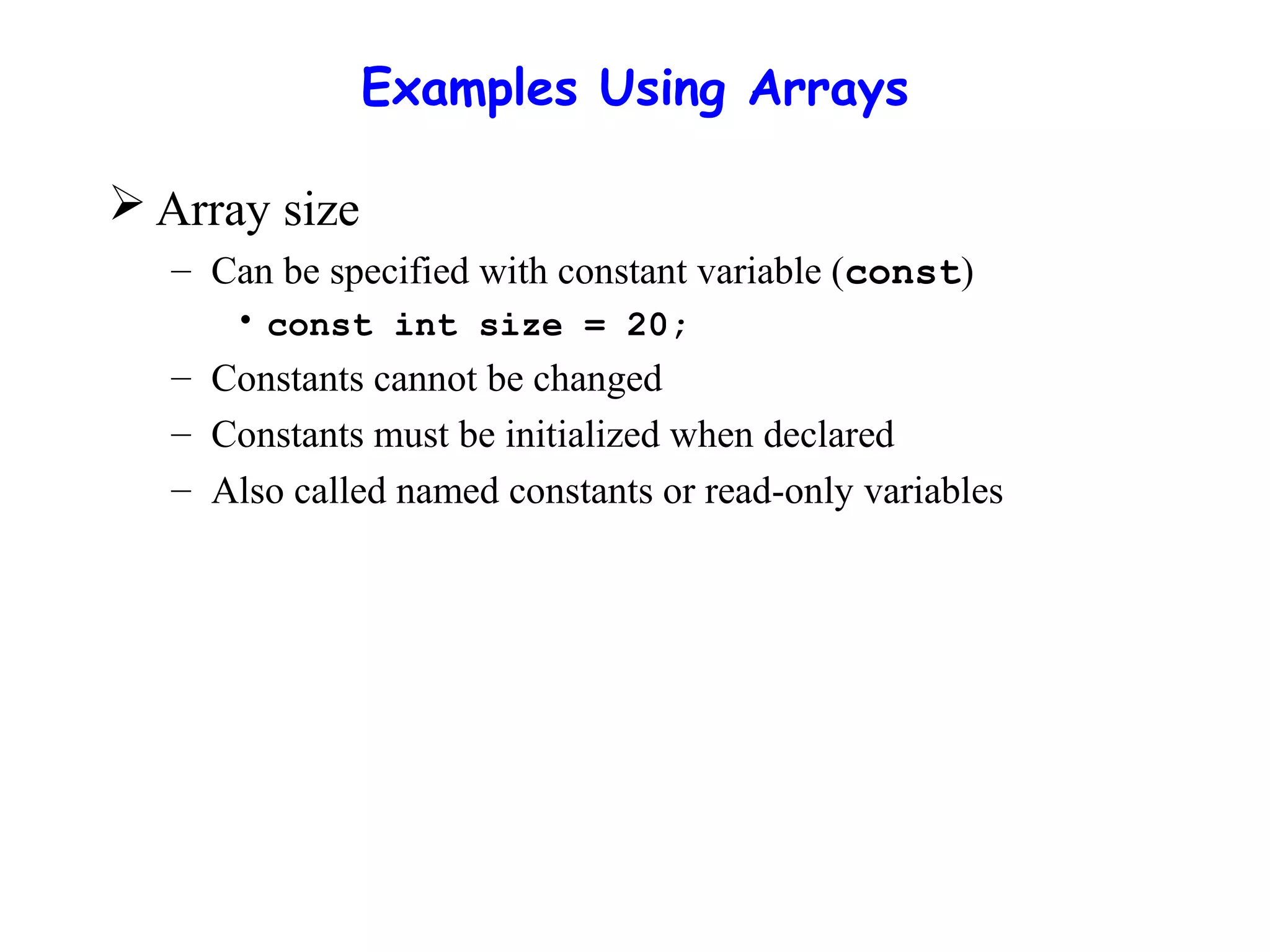
![1
2 // Initialize array s to the even integers from 2 to 20.
3 #include <iostream>
4
5 using std::cout;
6 using std::endl;
7
8 #include <iomanip>
9
10 using std::setw;
11
12 int main()
13 {
14 // constant variable can be used to specify array size
15 const int arraySize = 10;
16
17 int s[ arraySize ]; // array s has 10 elements
18
19 for ( int i = 0; i < arraySize; i++ ) // set the values
20 s[ i ] = 2 + 2 * i;
21
22 cout << "Element" << setw( 13 ) << "Value" << endl;
23
Note use of const keyword.
Only const variables can
specify array sizes.
The program becomes more
scalable when we set the array
size using a const variable.
We can change arraySize,
and all the loops will still
work (otherwise, we’d have to
update every loop in the
program).](https://image.slidesharecdn.com/lecture8-csp-170130123342/75/Lecture-8-introduction-to-array-with-examples-c-13-2048.jpg)
![24 // output contents of array s in tabular format
25 for ( int j = 0; j < arraySize; j++ )
26 cout << setw( 7 ) << j << setw( 13 ) << s[ j ] << endl;
27
28 return 0; // indicates successful termination
29
30 } // end main
Element Value
0 2
1 4
2 6
3 8
4 10
5 12
6 14
7 16
8 18
9 20](https://image.slidesharecdn.com/lecture8-csp-170130123342/75/Lecture-8-introduction-to-array-with-examples-c-14-2048.jpg)
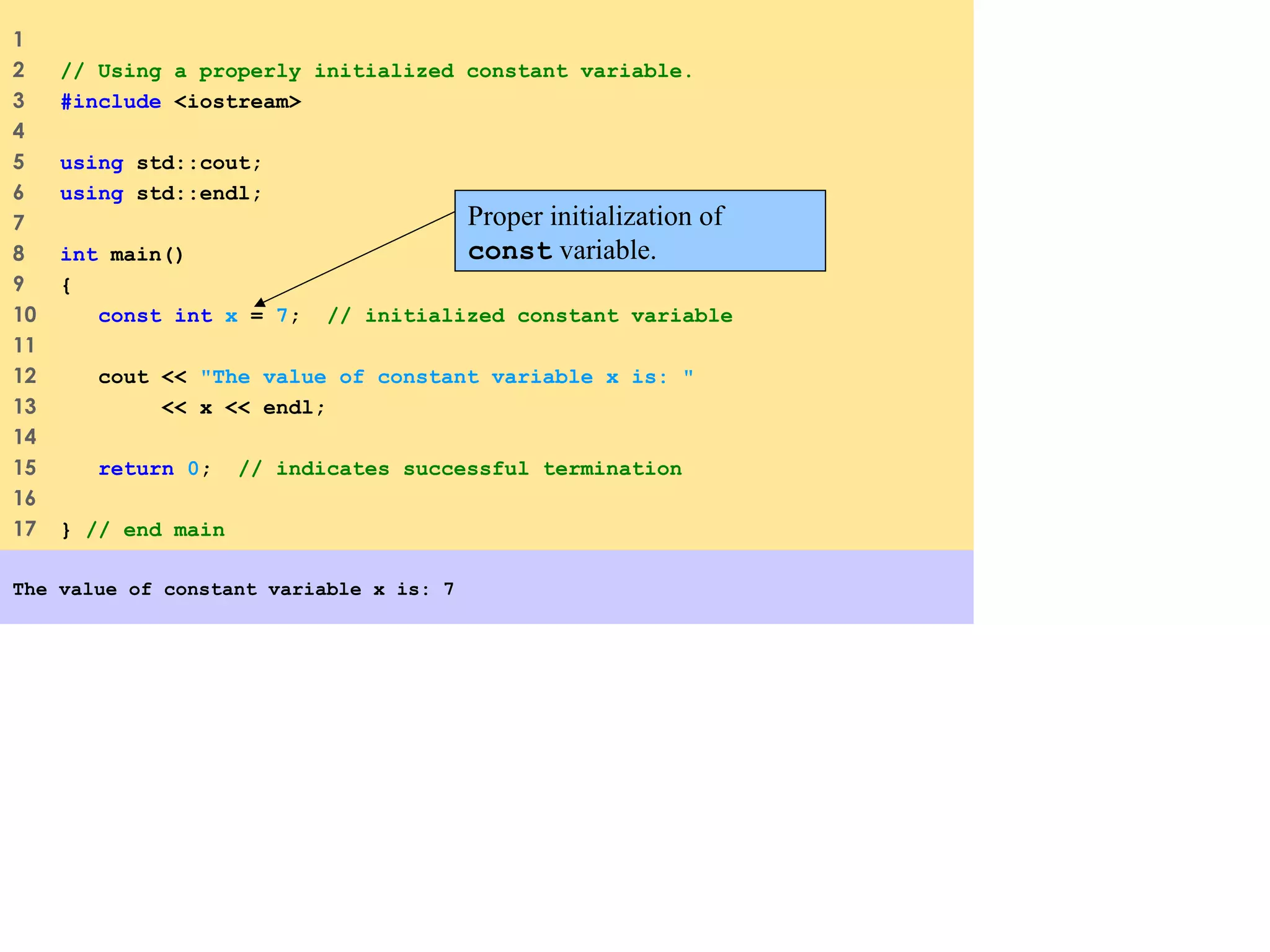
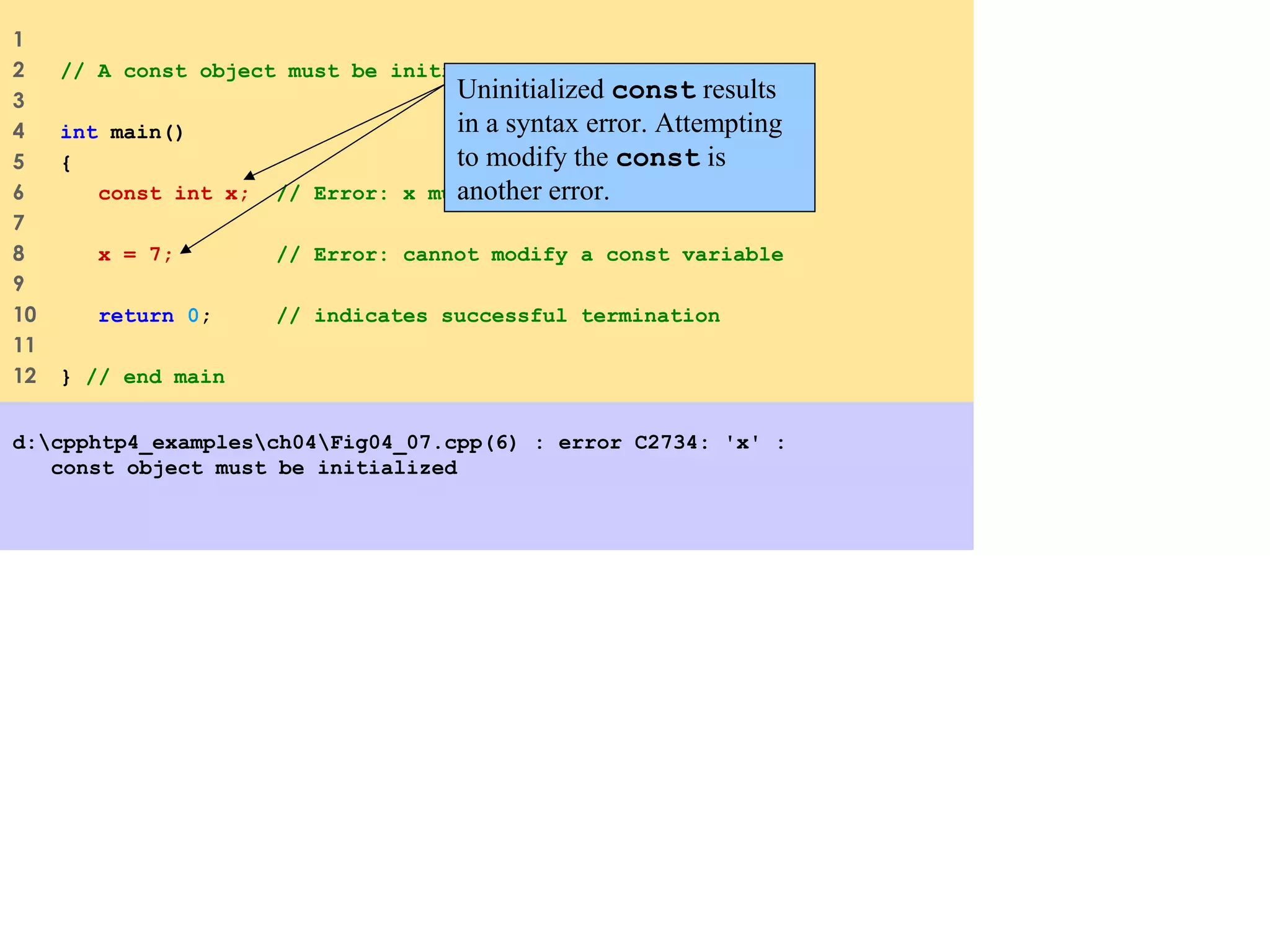
![1
2 // Compute the sum of the elements of the array.
3 #include <iostream>
4
5 using std::cout;
6 using std::endl;
7
8 int main()
9 {
10 const int arraySize = 10;
11
12 int a[ arraySize ] = { 1, 2, 3, 4, 5, 6, 7, 8, 9, 10 };
13
14 int total = 0;
15
16 // sum contents of array a
17 for ( int i = 0; i < arraySize; i++ )
18 total += a[ i ];
19
20 cout << "Total of array element values is " << total << endl;
21
22 return 0; // indicates successful termination
23
24 } // end main
Total of array element values is 55](https://image.slidesharecdn.com/lecture8-csp-170130123342/75/Lecture-8-introduction-to-array-with-examples-c-17-2048.jpg)
![1
2 // Histogram printing program.
3 #include <iostream>
4
5 using std::cout;
6 using std::endl;
7
8 #include <iomanip>
9
10 using std::setw;
11
12 int main()
13 {
14 const int arraySize = 10;
15 int n[ arraySize ] = { 19, 3, 15, 7, 11, 9, 13, 5, 17, 1 };
16
17 cout << "Element" << setw( 13 ) << "Value"
18 << setw( 17 ) << "Histogram" << endl;
19
20 // for each element of array n, output a bar in histogram
21 for ( int i = 0; i < arraySize; i++ ) {
22 cout << setw( 7 ) << i << setw( 13 )
23 << n[ i ] << setw( 9 );
24
25 for ( int j = 0; j < n[ i ]; j++ ) // print one bar
26 cout << '*';
Prints asterisks corresponding
to size of array element,
n[i].](https://image.slidesharecdn.com/lecture8-csp-170130123342/75/Lecture-8-introduction-to-array-with-examples-c-18-2048.jpg)
